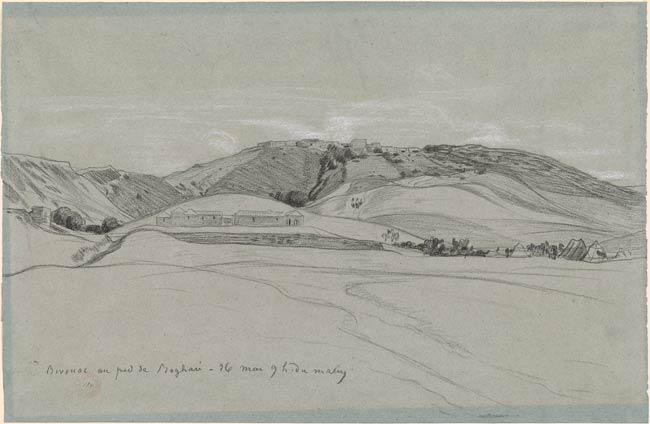
Fromentin first visited Algeria in 1846, a year before his debut at the Salon. He soon returned to there for longer stays and established himself as a specialist in North African subjects, showing eleven Algerian-themed works in the 1850-51 Salon. Fromentin's travels through North Africa took him beyond the colonial outposts surrounding Algiers. A gifted writer, Fromentin recounted his experiences of a summer spent traversing the Sahara in a memoir published in 1856. His group often traveled by foot, at night sleeping in tents around a campfire, devising their own entertainment amid the isolation of the desert. Fromentin was overwhelmed by the beauty of the arid landscape and remarked that the sunrises “spread like a rain of pale gold.”
He felt particularly connected to the village of Boghari. “I made a real discovery when I arrived here; because I found that next to Boghar, the only point that I knew by name, and which, for me, represented an entire country, there is another that no one talks about, no doubt because of its strategic uselessness, or, more probably, because of its extraordinary aridity. This country, which in no way resembles the first, is called by a name which sounds like a diminutive of Boghar, Bohgari.” The small Arab village, perched on a sunny hill, captivated the artist, who was even hesitant to make drawings of the site lest it would attract visitors and spoil its peaceful atmosphere.
On this sheet Fromentin overcame his reluctance and depicted a serene view of the valleys and mountains surrounding the village. The site is a temporary military camp, or bivouac, just outside Bohgari. Atop the mountain ridge sits the Ksar el-Boukhari, or the old walled quarter of the city which was a longstanding commercial hub for the pastoral villages in the area and fostered trade in wool, livestock, and grains. Fromentin wrote in his journal about his depictions of the area, “And of this painting, which I copy from nature, but which will lack the grandeur, the brilliance and the silence, and which I would like to describe with signs of flames and words spoken in a low voice, I will only keep one note which contains everything.” This quintessential Arabic village stood in distinct contrast to the rapidly changing and modernizing Paris to which Fromentin would soon return.
Inscribed at lower left: Bivouac au pied du Boghari 26 mars 9 J. du matin.
McIntosh, DeCourcy E., former owner.
James Thompson and Barbara Wright, Eugène Fromentin, Paris: ACR Èdition, 1987, p. 134.
